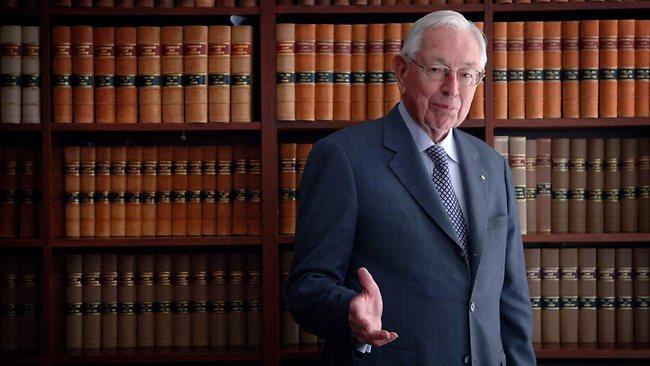Role with Kerr 'would have barred Mason as top judge'
ANTHONY Mason may not have been appointed chief justice of the High Court had his counselling of John Kerr been known.

MINISTERS from the Whitlam, Hawke and Keating governments claim Anthony Mason may not have been appointed chief justice of the High Court in 1987 had they been aware he had secretly and extensively counselled governor-general John Kerr in the lead-up to the dismissal of the Whitlam government.
Ralph Willis, a backbench MP during the Whitlam government and treasurer in the Hawke and Keating governments, told The Weekend Australian there was no way a judge who had counselled Kerr to dismiss a Labor government would have been appointed chief justice.
Mr Willis said Mr Mason should have "come clean when offered the role of chief justice".
Mr Willis, who was employment and industrial relations minister at the time of the appointment in 1987, says Sir Anthony's role -- which is documented in a new biography of Gough Whitlam and has been substantially confirmed by Sir Anthony this week -- deserves to be condemned like Kerr.
The Labor Party demonised the governor-general after the dismissal in November 1975.
"Mason kept quiet about his influential role in the dismissal," Mr Willis said. "In so doing, he deceived two Labor governments and hence is every bit as deserving as Kerr of the condemnation of history."
His strong rebuke of Sir Anthony, who served as a High Court judge from 1972 to 1987 and chief justice from 1987 to 1995, comes as other former ministers told The Weekend Australian of their surprise and outrage over Sir Anthony's role, but only some are prepared to comment publicly.
They suggest Sir Anthony's conduct will significantly tarnish his substantial legacy as a chief justice who oversaw several landmark judgments, including Mabo in 1992.
Sir Anthony has confirmed extensive discussions with Kerr during the political crisis, discussed the "reserve powers" that were used to dismiss Mr Whitlam and drafted a letter of dismissal for Kerr to use.
While Sir Anthony says he did not "encourage" dismissal and urged Kerr to "warn" Mr Whitlam of his intentions, Kerr's papers say he was "fortified" by the counsel, which he described as a "running conversation" throughout the crisis as the opposition delayed and then blocked the government's supply bills in the Senate.
Gareth Evans, a former attorney-general who was resources and energy minister in 1987, says although he was not "directly involved" in the appointment, he doubts whether it would have been made.
"Had this material, which goes much further than anything previously known about his role, been on the record in 1987, I think the government would certainly have thought long and hard about appointing Sir Anthony Mason as chief justice," Mr Evans said.
"Not because of anything it showed about his politics, but rather the extraordinary level of indifference to constitutional convention his behaviour revealed -- not in my view annulled by his difference with Kerr on the question of prior warning."
Mr Evans, like Mr Willis and other ministers, suggested Sir Anthony's hitherto secret role in the dismissal demanded a reassessment of his character.
"The emergence of this story won't, and shouldn't, affect Sir Anthony's legacy as a judge -- he in fact proved to be an excellent leader of the court," Mr Evans said. "But in the history books, his personal credit will, unhappily, emerge no less tarnished than that of Garfield Barwick and John Kerr himself."
Michael Duffy, who was communications minister at the time of Sir Anthony's appointment and later served as attorney-general, said: "Because of his involvement in the dismissal, I don't think he would have been appointed by the Hawke cabinet had we all known that at the time."
Barry Jones, science and technology minister in the Hawke government, said: "I was shocked by the extent of involvement by members of the High Court in reinforcing Sir John Kerr's determination to dismiss the Whitlam government.
"We all believed that governors-general only acted on the advice of prime ministers and that the judiciary was strictly independent. The events of November 1975 proved this to be wrong."
Kep Enderby, the Whitlam government's attorney-general and therefore the nation's chief law officer at the time of the dismissal, said this week Sir Anthony's discussions with Kerr were "scandalous" and "extraordinary . . . I am horrified that a High Court judge was interfering in political matters like this".
Former High Court judge Michael Kirby would not comment on Sir Anthony's involvement, but did point The Weekend Australian to what chief justice Gerard Brennan said at the ceremonial sitting of the High Court in 2001.
"Brennan pointed out that the controversy was sufficient to ensure that no such advice would ever be given again by a serving High Court justice to the then governor-general," Mr Kirby said.




